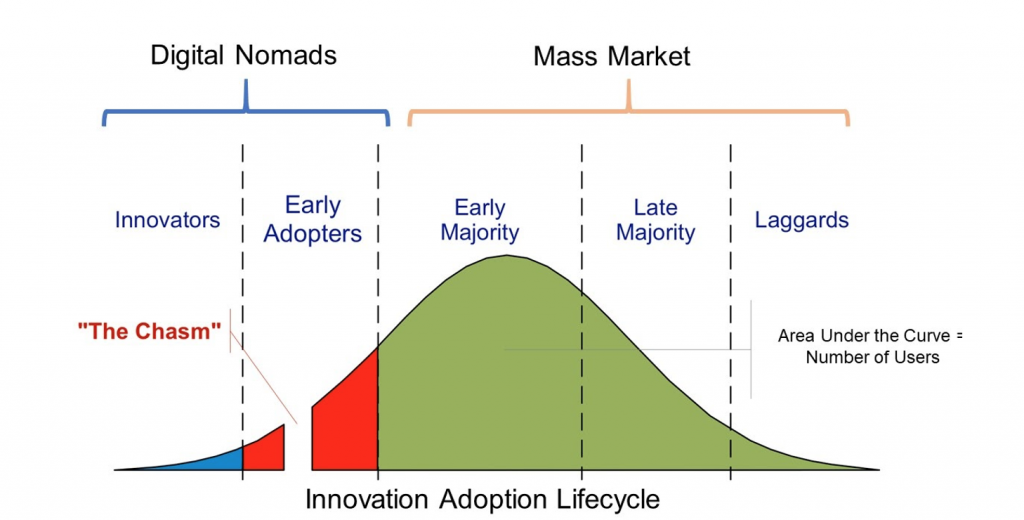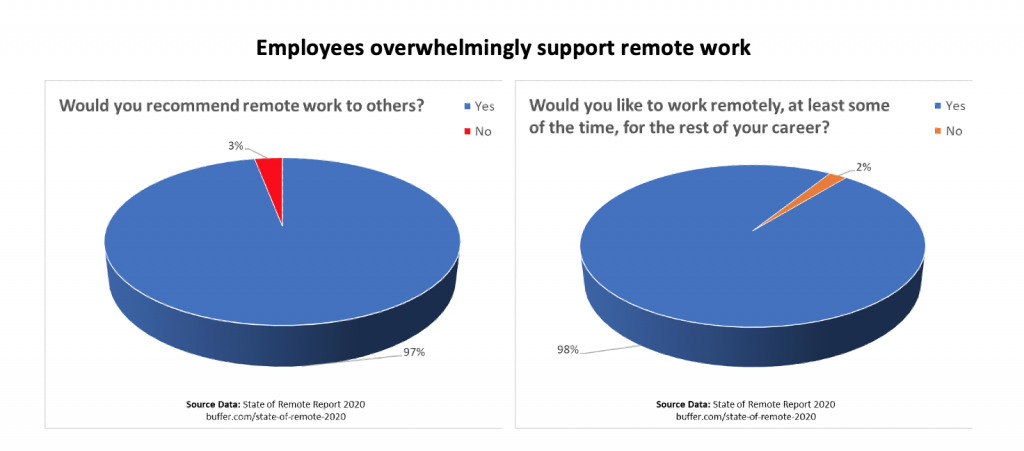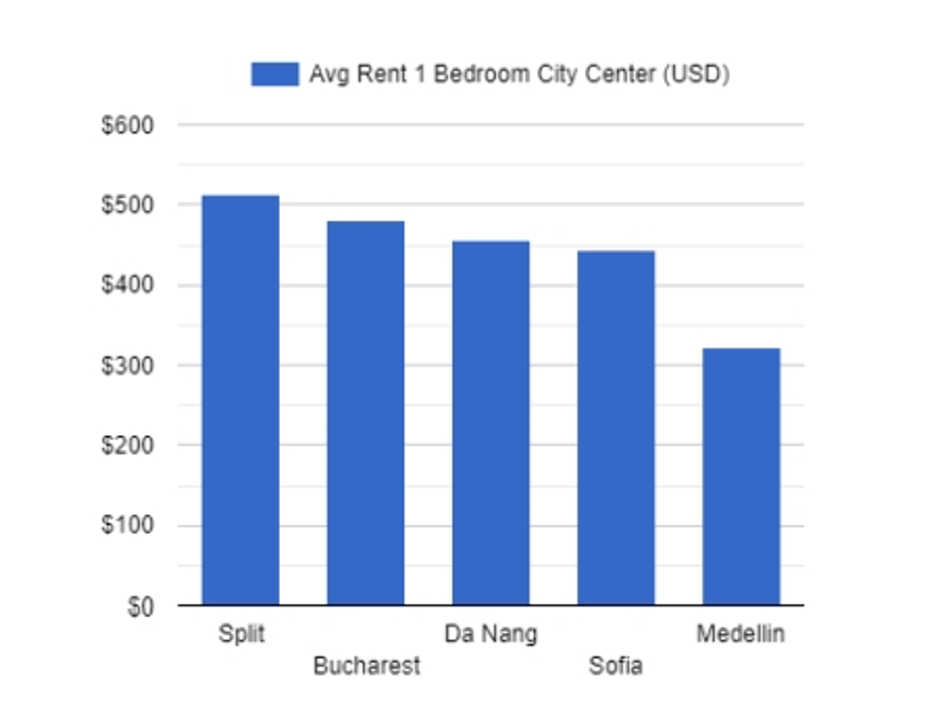During the month of December 2021, AMBITION will be highlighting its top 25 most-read articles of the year in reverse order, in the form of a thought leadership advent calendar. Here’s what is behind today’s door.
Remote workers and digital nomads can financially benefit by relocating from a high-cost area to a low-cost area. This generation can change cities, switch states, or move to different parts of the world, maximising their financial advantage, says Marco Sison
Originally published on 26 March 2021.
Sometimes even great ideas struggle to gain mass-market acceptance. Author Geoffery Moore calls this struggle ‘the Chasm’ when illustrating a Technology Adoption Life Cycle.
Innovators with lofty expectations push an idea forward. Meanwhile, the mass market, mired in inertia, resists early adoption.

Image Source: Wikimedia
Digital nomads have been proselyting the benefits of remote work since the late 1990s, but the benefits of decoupling where you live from where you work (Location Independence) and Geographic Arbitrage were crystallised when Tim Ferris succinctly stated in his Digital Nomad guide, The Four-Hour Workweek: ‘Fun things happen when you earn dollars, live on pesos, and compensate in rupees.’
While remote work has near-universal appeal to employees, employers have been resistant to change. Ferris published his de-facto digital nomad bible in 2007. Yet as late as 2018, surveys still showed only 2.9% of the US workforce worked remotely at least half the time.

Source Data: State of Remote Report 2020
However, even great ideas sometimes need an outside catalyst to gain mass-market acceptance. For Remote Work and Geographic Arbitrage, the pandemic may be the catalyst employees have been waiting for.
Remote work and the future of the office
Twitter, Facebook, Microsoft, and other notable companies have already announced permanent shifts away from a 100% office-centric workforce, even after the COVID lockdowns end. The transition is not US-centric; an international survey of 5,220 professionals in 31 countries also showed 86% of employers planning for remote work post lockdown. The traditional ‘9-5, commute to work’ culture we knew pre-Covid-19 is obsolete.
The pandemic has shifted what we know about location-dependent employment and has gifted today’s employees a once-in-a-generation opportunity to change the paradigm of what it means to ‘go to work.’
Remote work can mean any work outside of a traditional office. The continuum can be companies initially offering telecommuting on Fridays, allowing employees to work from home 50% or more, or for many professional office workers during the pandemic, allowing employees to do their job completely remote.
What is a digital nomad?
A quick Google search brings up 1,710,000 results for the ‘definition of a digital nomad.’ I am going to use the definition the Croatian Government codified when they passed their new Digital Nomad Visa this year (translated from Croatian):
‘Digital nomad is a third-country national who is employed or performs work through communication technology for a company or his own company that is not registered in the Republic of Croatia and does not perform work or provide services to employers in the Republic of Croatia.’ Decision On The Promulgation Of The Law On Foreigners Article 3 (43)
The key points in the Croatian definition are:
- Uses technology to work (Digital)
- The person is not from the country, nor has any business ties to the country (Nomad)
Digital nomad can be considered the moniker for an extreme subset of a remote worker. If telecommuting from home on Fridays is a Remote Work baby-step, being a digital nomad is a Usain Bolt sprint.
How digital nomads leverage remote work with geographic arbitrage
Since the dawn of work, employees have moved to where jobs were located. In nearly every country, population bases have moved away from low-cost rural locations to high-priced urban centres. The global density of cities and their cost of living have both consequently increased.
Remote work disrupts this location-dependent employment model by removing the need to live close to work. Without the need to live in expensive urban hubs, workers have a unique opportunity to reduce their monthly expenses through geographic arbitrage.
Geographic arbitrage takes advantage of the simple fact housing costs and living expenses will be significantly less in cheaper cities. For example, moving from San Francisco, CA to Portland, OR, can save you 43% on your monthly living cost.
What is geographic arbitrage?
Geographic Arbitrage, the term sounds technical, but it is straightforward. Let’s start with what is arbitrage?
‘In economics and finance, arbitrage is the practice of taking advantage of a price difference between two or more markets.’ –Wikipedia
If you have ever skipped the gas station next to your house to get cheaper gas down the street, you have practiced geoarbitrage.
Digital nomads use remote work to get well-paying jobs from in high-demand markets but use geographic arbitrage (i.e., geoarbitrage) to take advantage of lower prices in cheaper markets. Geoarbitrage could mean saving money by moving to different parts of the same city (moving from the city center to the suburbs), the same state (moving from a low-cost city to a high-cost city), or an extreme example, moving to a lower-cost state.
These examples are just if you think domestically, but if you can work remotely, then the world is full of possibilities.
Maximising geoarbitrage opportunities by living abroad
Slashing your monthly expenses by 10%, 20%, or even 40% by simply crossing state lines seems like a significant difference. But there is a transformative change when leveraging geoarbitrage overseas. Moving from the beaches in San Francisco to the beaches in Antalya, Turkey, can drop spending by over 80%.
Digital nomads can cut their monthly expenses dramatically by jumping on an airplane. The potential to cutting thousands of dollars each month and investing the savings can dramatically impact this generation’s financial future.
Different ways to financially leverage geoarbitrage
Save on housing
For example, I currently live in a large two-bedroom furnished apartment, a 15-minute walk from the beach in Split, Croatia. My rent, including utilities, is less than $600 per month. A similar-sized apartment in a medium-cost city in the US would cost $1,800, with no beach included.
Croatia has a moderate cost of living. Here is a comparison of one-bedroom apartments in some digital nomad hotspots in Southeast Asia, South America, and Eastern Europe.

Data Source: Nomadic FIRE Cost of Living Abroad
Increase your standard of living
Rent is not the only expense you save living abroad. Everything can be significantly better and cheaper overseas. I lived in Medellin, Colombia, for roughly $1,000 per month for all my expenses. The low cost of living in Medellin included an active social life, a fantastic apartment in a trendy part of town, frequent dining out, and weekly maid service, all luxuries I could not afford in the US.
Get affordable healthcare
Healthcare is a very US-specific savings, as healthcare costs for US citizens are the highest in the world. The cost of US health insurance for an individual is nearly $9,000 per year. In contrast, my private health insurance coverage in Spain was roughly $700 a year.
Minimise your taxes
Reducing your tax liability is very dependent on your citizenship, the country you live in, and the country where you generate your income. However, with the complexity comes significant tax minimising opportunities if you become a tax resident or set up a business in a tax-friendly country. Even the US, whose onerous laws tax citizens regardless of residency, or income location, can find potential tax savings with the IRS Foreign Earned Income Exclusion.
Some popular examples of countries with favorable tax laws available to digital nomads:
Costa Rica – offers a freelancer visa, and income from foreign sources is not subject to income tax.
Bulgaria- has a relatively low cost of living and a flat-rate income tax of just 10%
Croatia– just launched a digital nomad visa that excludes income earned as a digital nomad from income tax.
Please note that the above does not constitute as tax advice. Always seek an accountant for your specific needs.

Covid-19 has fundamentally affected our professional lives. With millions ‘working from home,’ the pandemic showed us that working outside the traditional office is a sustainable model. Large corporations initially skeptical of remote work have embraced it as a permanent business strategy.
This generation has a unique opportunity to change their financial futures. Remote work allows ‘where we work’ to no longer dictate ‘where we live.’ With geoarbitrage, remote workers and digital nomads can financially benefit by relocating from a high-cost area to a low-cost area. This generation can change cities, switch states, or move to different parts of the world, maximising their financial advantage.

Marco Sison is a Retirement Coach for Nomadic FIRE. USA Today, US News and World Reports, MSN Money, Yahoo Finance, and other media feature him as a trusted source for living abroad and personal finance. He has traveled to more than 40 countries to show the best ways to save, invest, and live overseas.
www.nomadicfire.com/live-abroad
LinkedIn: https://www.linkedin.com/in/marcosison/
Facebook: https://www.facebook.com/marcosison1
Instagram: https://www.instagram.com/nomadic.fire/
Youtube: Nomadic FIRE
Twitter: Nomadic_FIRE



